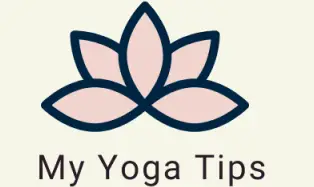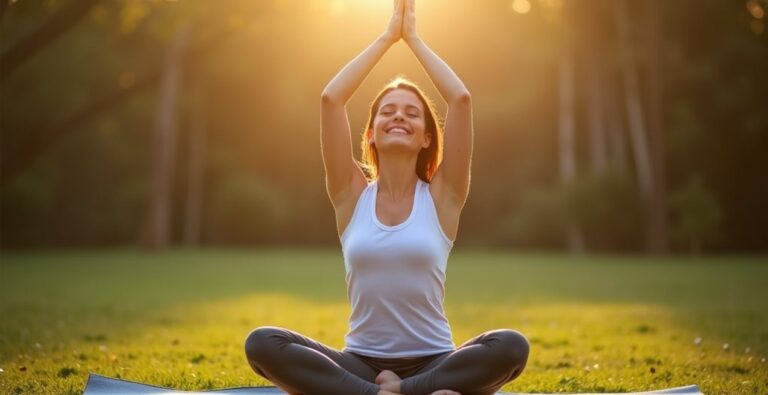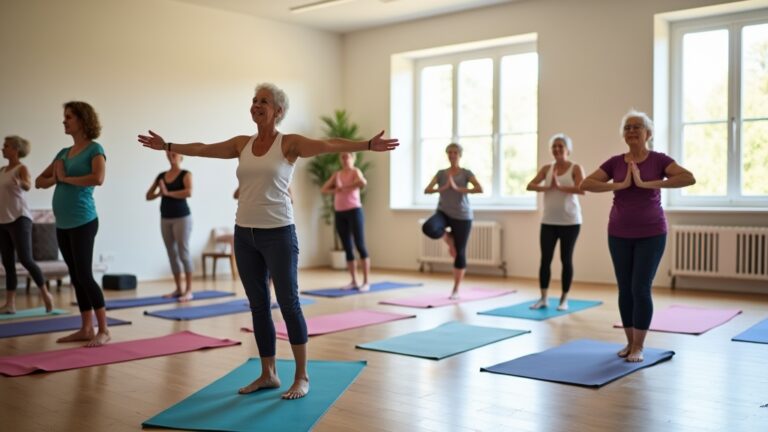How Yoga and Meditation Help Reduce Anxiety and Depression
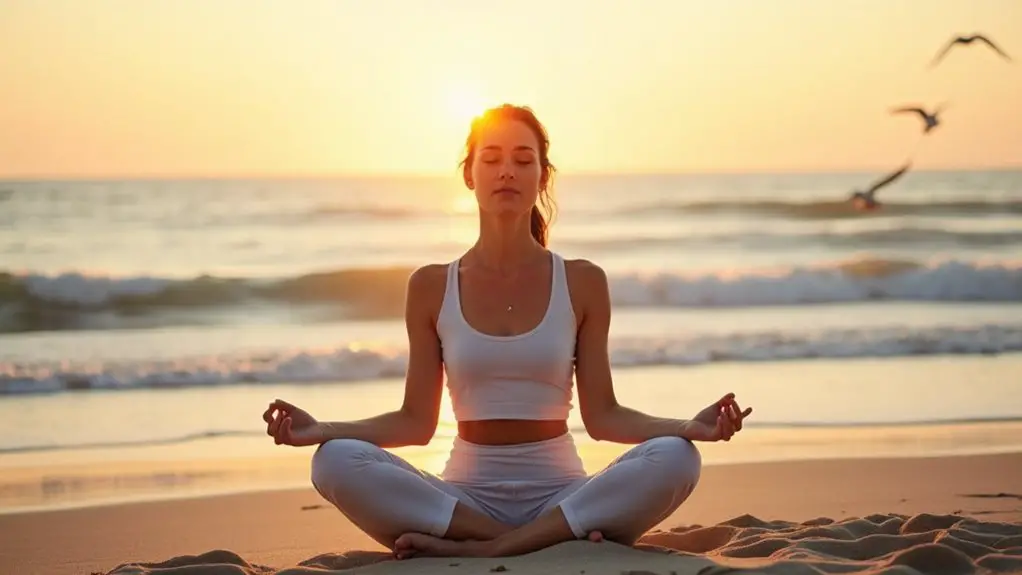
Imagine if you could erase almost all your anxiety and depression with just a few simple practices. While that might be an exaggeration, yoga and meditation come remarkably close. These practices combine physical postures, breathing exercises, and meditation to reduce stress, manage anxiety, and alleviate depression. By lowering cortisol levels, increasing GABA, and enhancing emotional regulation, yoga and meditation can considerably improve your mood and overall mental well-being. But how exactly do they achieve this? Let's explore the mechanisms behind their effectiveness.
Stress Reduction Through Yoga and Meditation
When you practice yoga and meditation, you're engaging in a holistic approach that can greatly reduce stress. This combination of physical postures, breath control, and meditation works on multiple levels.
A single session of yoga components, including meditation and breathing, can reduce acute stress reactivity in adults by 71% in physiological outcomes and 65% in psychological outcomes.
Yoga enhances heart rate variability, a marker of stress resilience, and leads to lower stress levels, especially in experienced practitioners.
Physiological measures such as heart rate and blood pressure are improved through regular practice.
Breathing techniques, like pranayama, trigger the body's relaxation response, activating the parasympathetic nervous system and reducing stress hormones like cortisol. The evidence from the systematic review supports that 71% of physiological studies reported reduced stress reactivity, underscoring the effectiveness of yoga for stress management.
Anxiety Management With Yoga and Meditation
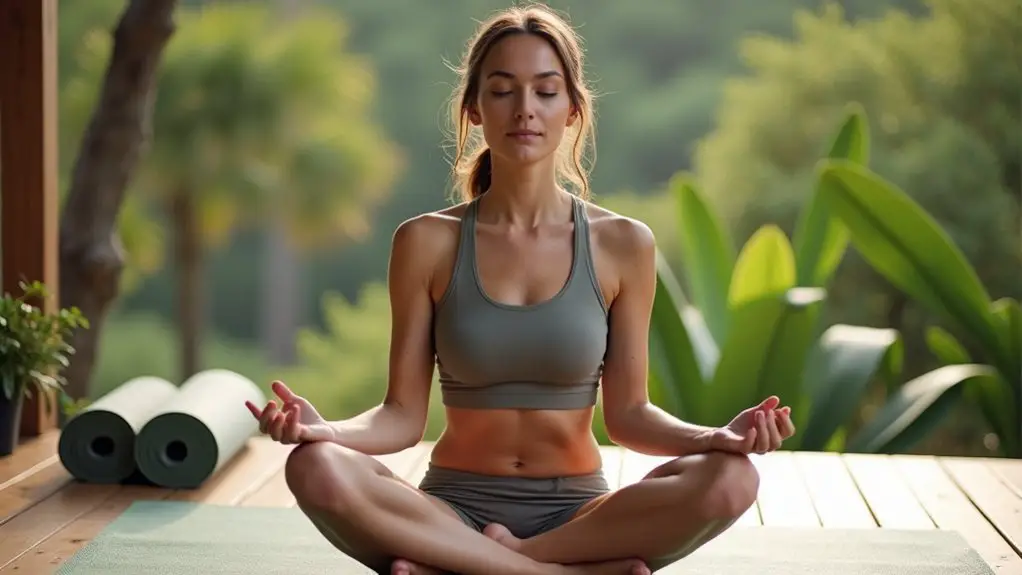
Practicing yoga and meditation can be a powerful tool for managing anxiety, offering a multifaceted approach that addresses both the physical and emotional aspects of this common mental health issue.
Studies have shown that yoga is markedly more effective in reducing anxiety than standard education on stress management, though it's less effective than cognitive behavioral therapy (CBT). For instance, 54% of participants practicing yoga met criteria for improved symptoms, compared to 33% in the stress education group and 71% in the CBT group.
Yoga's benefits include reducing chronic nervousness and worry, and its practices, such as physical postures and breathing techniques, stimulate the vagus nerve, enhancing relaxation and reducing stress hormones like cortisol. Additionally, research indicates that 70% of studies showed improvements in anxiety symptoms when yoga interventions were implemented.
While yoga's anxiety-reducing effects are pronounced in the short term, they may not be sustained at six months, highlighting the need for potentially combining yoga with other therapies for long-term benefits.
Depression Relief Using Yoga and Meditation
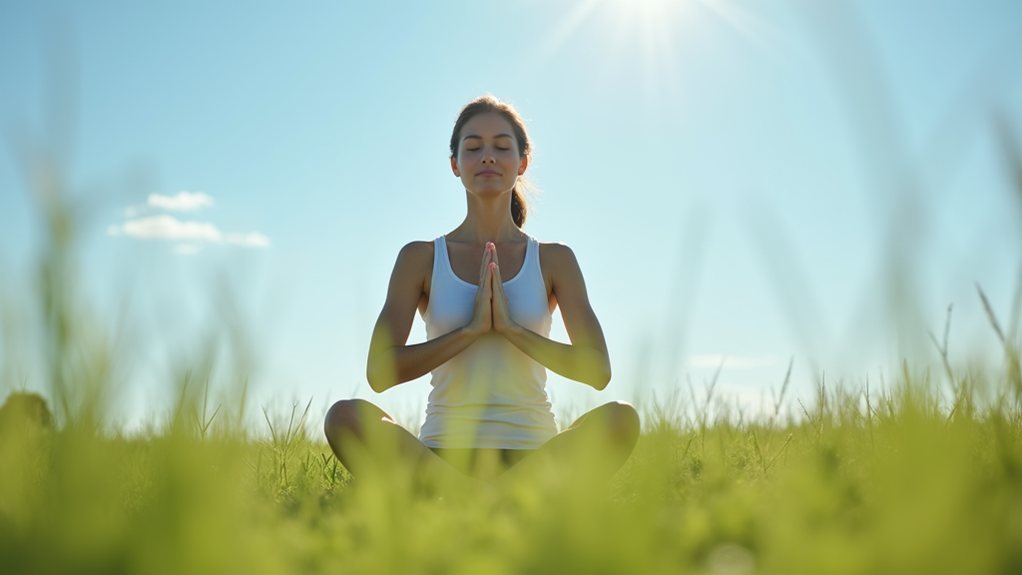
Yoga and meditation have emerged as valuable tools in the management of depression, offering a holistic approach that addresses both the physical and emotional aspects of this complex mental health condition.
When you incorporate yoga into your routine, you can expect several benefits:
- Comparable to other treatments: Yoga shows similar benefits to other evidence-based treatments like medication and exercise for major depressive disorder, making it a viable adjunctive treatment option.
- Short-term effects: Systematic reviews and meta-analyses indicate that yoga has moderate short-term effects on depression, comparable to relaxation and aerobic exercise.
- Specific interventions: Hatha yoga, in particular, has been shown to notably reduce depression severity, with participants experiencing statistically and clinically significant reductions in depressive symptoms. Yoga also complements other therapies, such as mindfulness-based meditation, which has been shown to have lasting positive effects on depression.
Consistent practice, whether it's twice-weekly 90-minute sessions or other schedules, can lead to positive outcomes in managing depression.
Emotional Regulation and Yoga Practice
In managing depression and anxiety, the ability to regulate emotions is essential, and yoga practice has been shown to play an important role in this process.
Combining aerobic jogging with mindfulness-based yoga can greatly improve your implicit emotion regulation ability. This combination enhances your aerobic fitness, which is a key mediator in improving emotion regulation, and it also cultivates mindfulness through meditation, reducing avoidance and rumination.
An 8-week mind-body exercise intervention, which includes such a combination, has been shown to improve implicit emotion regulation ability through increased aerobic fitness.
Yoga practice influences various neurotransmitter systems, such as increasing GABA levels, which can improve your mood and reduce anxiety.
It also improves the functioning of the prefrontal cortex, a brain region vital for emotional regulation, and decreases cortisol levels, promoting relaxation.
Improved Sleep Quality and Long-Term Mental Health Benefits
As you navigate the complexities of managing anxiety and depression, improving your sleep quality can be a crucial step towards overall mental well-being.
Yoga and meditation have been proven to reduce sleep disturbances in various populations, including children with Autism Spectrum Disorder, pregnant women, and postmenopausal women.
Here are some key ways these practices can help:
- Reduce Sleep Disturbances: Yoga and meditation, particularly mindfulness meditation, can manage insomnia, reduce fatigue and depression, and alleviate symptoms of restless leg syndrome (RLS).
- Induce Relaxation: These practices induce the relaxation response, a deep physiological shift opposite to the stress response, which aids in sleep. Techniques like yoga nidra can access delta brainwaves, responsible for deep sleep. Regular practice also enhances sleep quality by reducing stress, with over 85% of practitioners experiencing reduced stress.
- Improve Mental Health: Regular yoga practice can decrease cortisol levels, reduce symptoms of depression and anxiety, and enhance overall mental well-being by reducing stress and improving mood.
